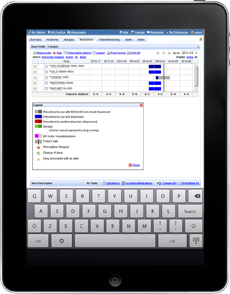The Clinical Informatics Research Group is also involved in these projects:
International Pharmacosurveillance
The purpose of this project is to develop state-of-the-art methods for i) monitoring, and ii) analyzing the comparative risk and benefit of new drug therapies, in real-time, through an international prospective surveillance system, and iii) communicating this information to clinicians to inform treatment decision-making at the point-of-care. A multi-national surveillance system that builds on international efforts to deploy electronic health records can produce more timely and robust information about drug-safety and effectiveness.
Study Objectives This research program will address three key aspects of an international surveillance and communication system:
-
Estimate the completeness and comparability of EHR, IVRS-enabled patient self-report, and administrative data available for measuring the safety and comparative effectiveness of drug exposures, outcomes, and confounders/modifiers for three drug groups (anti-hypertensives, oral hypoglycemics, anti-depressants) from centers in three countries.
-
Develop and validate the use of distributed meta-analytic methods of evaluating the comparative safety and effectiveness of drugs.
-
Assess the usefulness of presenting comparative safety and effectiveness information surveillance information to physicians and its impact on prescribing decisions.
CUR-IT: Canadian-US Research in Information Technology
Improving patient safety and chronic disease management with a new generation of health information. This team combines the resources of three leading health informatics centers (McGill University, University of Ottawa, and Harvard University) to develop a new generation of personalized decision support to minimize preventable adverse events and enhance the management of chronic disease. They integrate methodological advances in computer science, engineering, epidemiology, biostatistics, pharmacogenetics, psychology, management, medicine, and rehabilitation sciences into new approaches for health system re-design.
This cross border collaborative is aimed at sharing best practices, accelerating learning, and testing interventions in a variety of populations and settings. This is accomplished through several projects which target the areas of improving pharmacosurveillance, development of a hospital based adverse events surveillance system, improving care at hospital discharge using IT, decision support tools, the evaluation of anonymization tools, and the training of additional highly qualified personnel.
PHIRE
The PHIRE team has extensive expertise in the development, evaluation and implementation of advanced methodologies and systems for the analysis of health-related data. In the last decade, we have successfully created decision support systems to help support health care and generate meaningful data for research from administrative data and electronic health records. We have acquired skills to use rich, real-time data resources to generate accurate and significant health outcomes measures.
PHIRE services and products enable our clients to make better decisions and achieve better outcomes. We help derive actionable insights by applying advanced analytical methods to large volumes of health-related data. We work with our clients to characterize research questions and practical problems and then develop and implement strategies, software, and computing infrastructures for data integration, analysis, and prediction. We strive for success and efficiency through a relentless focus of generating the best possible outcomes with the appropriate use of robust analytical methods, cutting-edge technologies, and innovative software.
Visit the PHIRE Inc. website here.


